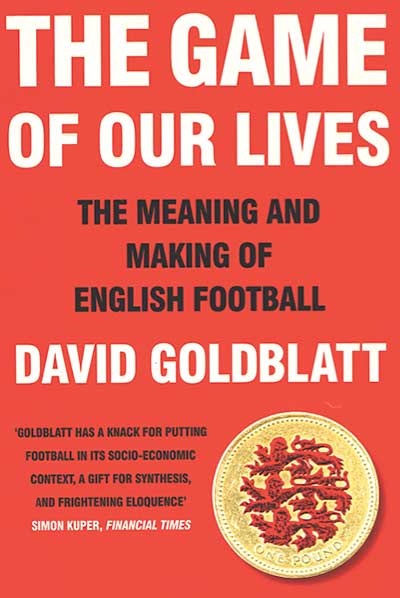 The meaning and making of English football
The meaning and making of English football
by David Goldblatt
Viking/Penguin, £16.99
Reviewed by Alan Tomlinson
From WSC 335 January 2015
David Goldblatt writes with the authority of a serious academic theorist of the globalisation process, but displays a lucidity and fluency to match the best feature journalists and sport writers. In The Game Of Our Lives he draws on specialist journalism, consultancy reports, arcane academic findings, new media and personal observations to analyse how English football has both mirrored and anticipated the broader neo-liberal agenda over the last two or three decades. Citing JK Galbraith in his conclusion, Goldblatt argues that English football represents the triumph of unaccountable affluence for the few over the many whose experiences and hopes are increasingly defined by the deprivations that denies them access to the game’s new riches.
The book confirms how swiftly the Premier League seized power in the early 1990s, and how timid the FA were in defence of the traditional values of the game. There may have been reviews, commissions and discussion of the need for serious change and modernisation; but the FA never managed to act, beyond the backing of the Taylor report for reform following the Hillsborough tragedy. Yet the consequent modernisation of grounds, in significant levels publicly funded in the name of community and civic goals, was a transformative project that Rupert Murdoch must have thought was a ruse or a booby-trap. But no, here it was on the eve of transnational satellite broadcasting: a cleansed and modernised infrastructure for him to buy into and sell on worldwide. Rarely has any besieged culture handed the battering-ram to the invasive aggressor in such a naive and timid way.
Goldblatt knows the sport too, and this is far from any dry history of the economics and politics of the game. He conveys the enduring cultural appeal of football, the resonance of matchday in the face of the forces of “fragmentation and distraction” that the new mobile media bring to bear in threatening the crowd’s “unbroken engagement and shared experience”. Analyses of the culture of the game, including the lost genius of the flawed Paul Gascoigne and the global profile of the feted metrosexual David Beckham, alternate through the book with vignettes on the political and economic realities of the emerging neo-liberal agenda. He illuminates the meaning of the game in its Premier League phase, balancing an evocation of its excellence and attractions with a critique of its financing and governance, reminding us too of the collective values that originally made football possible in its modern form, and of the game’s capacity to offer models of co-operative endeavour.
In a synthesising achievement of this scale, errors will certainly have crept in, and Burnley’s former chairman Barry Kilby is presented as “benefactor… Barry Kidder”. Wigan Athletic were formed in 1932, not “the late 1970s”, which was when they replaced Southport in the League; England’s “first defeat by a foreign team at home” was not the Hungarian lesson at Wembley in 1953, but a 2-0 loss to Ireland at Goodison Park in 1949. But this is a superb study that will surely inform and sustain debate on the nature and culture of the game, and the impact of the excesses of the Premier League upon football’s rich cultural legacy.